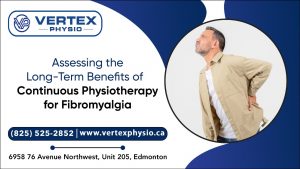
Fibromyalgia, characterized by widespread pain and fatigue, poses a significant challenge for the affected individuals, impacting their everyday activities and overall quality of life. Known as fibromyalgia physiotherapy in Edmonton, this specialized form of physiotherapy offers sustained support and treatment, focusing on pain management, physical strengthening, and improving functional mobility. Through a regular and long-term approach to fibromyalgia physiotherapy, patients can experience gradual improvements that not only help to relieve pain but also enhance their ability to engage more fully in life’s daily demands. This commitment to ongoing care is essential for realizing the long-term benefits that physiotherapy can offer to those living with fibromyalgia.
Overview of Fibromyalgia
Fibromyalgia is characterized by chronic pain, fatigue, sleep disturbances, and often emotional and cognitive disruptions. Fibromyalgia physio in Edmonton is a cornerstone in the multidisciplinary approach to managing these symptoms effectively.
Long-Term Benefits of Continuous Physiotherapy for Fibromyalgia
Comprehensive Pain Management
Detailed Techniques and Outcomes:
- Manual Therapy: Techniques like myofascial release and manual trigger point therapy target specific areas of muscle tightness and trigger points that are common in fibromyalgia patients. This manual manipulation helps to release these points, significantly reducing pain levels and improving muscle function.
- Pain Modulation: Physiotherapists utilize techniques that influence pain pathways, including TENS (Transcutaneous Electrical Nerve Stimulation) and ultrasound therapy, which help reduce pain perception and improve patients’ tolerance for other therapeutic exercises.
Enhanced Mobility and Functional Independence
Strategies for Sustained Improvement:
- Progressive Strengthening Programs: Customized strengthening programs focus on gradually increasing the load and complexity of exercises to build muscle without overwhelming the patient. This approach ensures sustainable muscle growth and joint support, leading to improved daily functioning.
- Functional Training: Targeted exercises that simulate daily activities (functional mobility tasks) are used to directly enhance patients’ ability to perform daily tasks like cooking, cleaning, and personal care, thereby boosting their independence.
Improved Aerobic Capacity
Tailored Cardiovascular Health Programs:
- Low-Impact Aerobics: Designed to minimize joint stress while providing cardiovascular benefits, activities like water aerobics, stationary biking, or slow-paced treadmill walking are often recommended. These activities help improve overall stamina and reduce fatigue, which is a prominent symptom of fibromyalgia.
- Consistent Endurance Training: Regular, moderate-intensity aerobic exercise is shown to improve pain management and enhance energy levels, fostering a better overall sense of well-being.
Psychological Benefits
Cognitive and Emotional Support:
- Mind-Body Techniques: Incorporating practices such as yoga, which blends physical movement with relaxation and mindfulness, helps improve physical and mental health. This practice is particularly beneficial in managing stress and reducing anxiety, which can exacerbate fibromyalgia symptoms.
- Behavioural Approaches: Cognitive-behavioral strategies may be integrated into physiotherapy sessions to help patients alter negative patterns of thinking and behaviour related to pain, enhance their coping mechanisms, and improve their response to physical discomfort.
Improved Sleep Quality
- Sleep Cycle Regulation: Regular physiotherapy can help normalize sleep patterns disrupted by chronic pain and stiffness. Techniques such as gentle stretching and relaxation exercises performed before bedtime can reduce muscle tension and promote ease of falling and staying asleep.
- Reduction in Sleep Disturbances: As pain decreases through consistent physiotherapy, the common sleep disturbances associated with fibromyalgia are often alleviated, allowing for more restful and restorative sleep.
Enhanced Respiratory Function
- Breathing Exercises: Physiotherapy often incorporates breathing exercises which improve diaphragmatic function and increase lung capacity. By improving diaphragmatic function, these exercises enhance lung capacity and ensure better oxygen delivery to tissues, significant for muscle function and overall energy levels. Efficient breathing helps improve endurance and reduces the fatigue associated with fibromyalgia.
- Stress Reduction: Improved breathing techniques also help in managing stress and anxiety, which are commonly experienced by fibromyalgia patients. Regular practice of these breathing techniques helps manage stress and anxiety, conditions often exacerbated by chronic pain disorders like fibromyalgia. By lowering stress levels, breathing exercises contribute to better pain management and enhance the quality of life.
Improved Social Functioning
- Increased Activity Levels: As symptoms improve, patients may find it easier to engage in social activities and hobbies they enjoy, leading to improved social interactions and a broader support network.
- Reduced Isolation: Engagement in community activities and group physiotherapy sessions can decrease feelings of isolation and improve overall mental health by building connections with others facing similar challenges.
Decreased Risk of Comorbid Conditions
Prevention of Secondary Conditions: Continuous physiotherapy can help prevent or manage comorbid conditions often associated with fibromyalgia, such as cardiovascular disease, type 2 diabetes, and osteoporosis, by promoting an active lifestyle and improving physical health.
- Cardiovascular Health: Regular physical activity as part of a physiotherapy regimen can help maintain and improve cardiovascular health, diminishing the risk of heart disease, which can be elevated in patients with chronic inflammation and pain.
- Type 2 Diabetes Management: Physiotherapy helps maintain a healthy weight and improves metabolism, which is crucial for managing or preventing type 2 diabetes, a common comorbidity with fibromyalgia due to reduced physical activity.
- Osteoporosis Prevention: Weight-bearing exercises, often recommended in physiotherapy sessions, are vital in maintaining bone density and strength, thereby preventing osteoporosis, another potential comorbidity due to the sedentary lifestyle that pain and fatigue may impose.
Enhancing Well-Being
In conclusion, the long-term benefits of continuous physiotherapy for fibromyalgia are undeniable. Vertex Physiotherapy in Edmonton offers a dedicated approach to fibromyalgia treatment that not only addresses the physical symptoms but also supports the emotional and psychological well-being of patients.
If you or someone you know is battling this challenging condition, reaching out to Vertex Physiotherapy for fibromyalgia physio in Edmonton can be a transformative step towards a better, more active life.
Contact us today to learn more about how our tailored fibromyalgia treatment plans can help manage symptoms effectively and enhance your daily functioning. Embrace the opportunity for recovery and reclaim your health with the support of dedicated physiotherapy experts.
